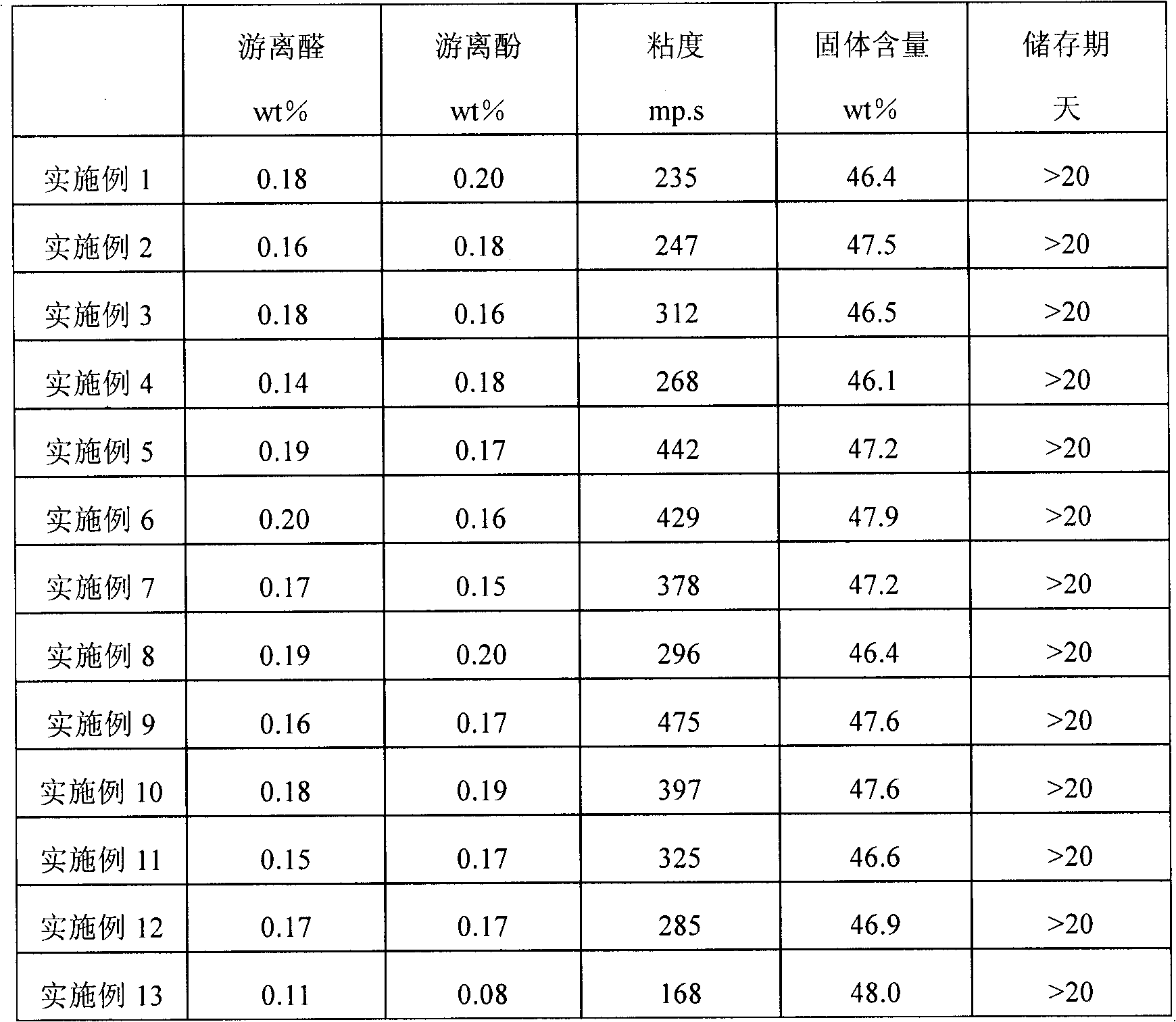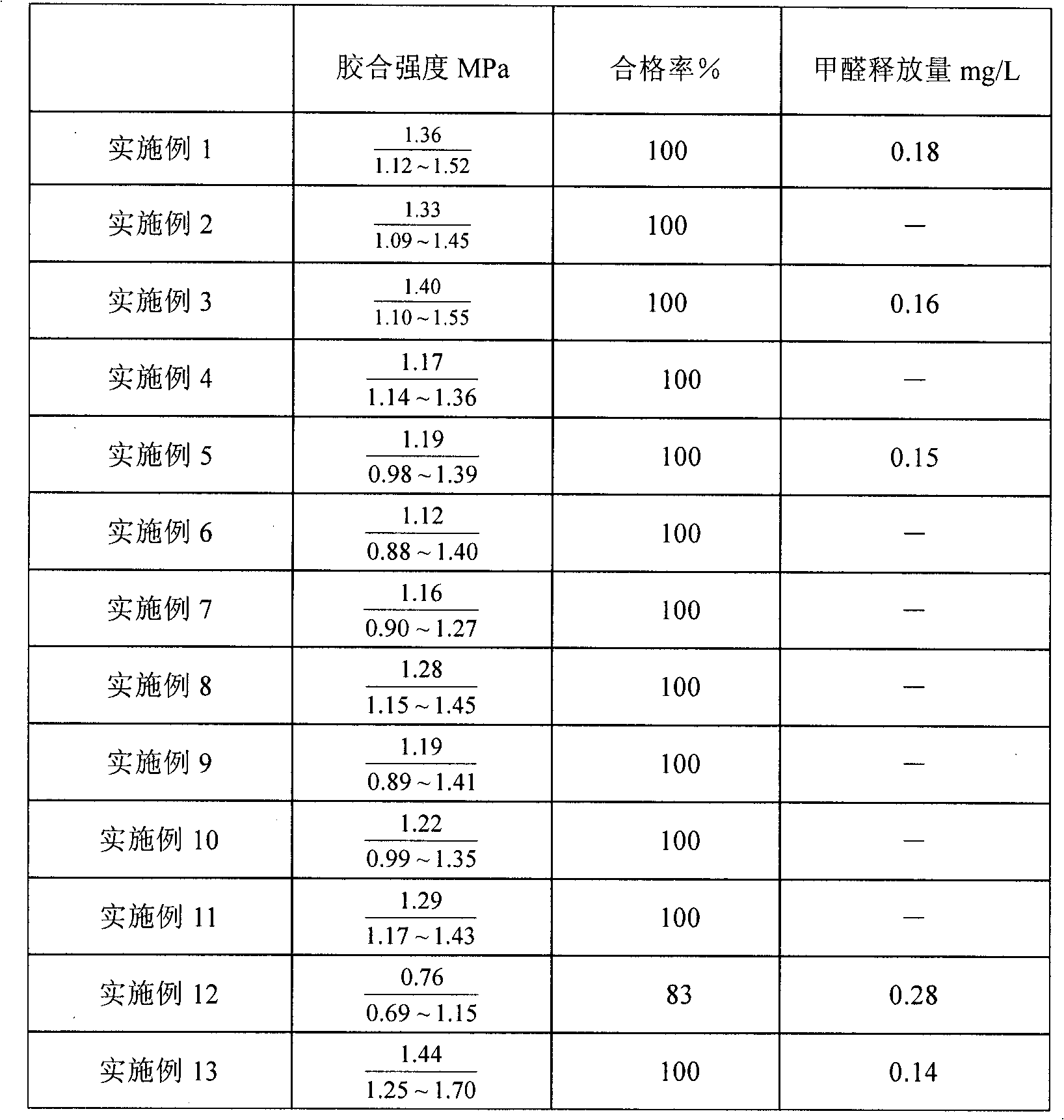Method for preparing environmentally-friendly adhesive for lignin-based timber
A lignin-based, lignin-based technology, which is applied in the field of preparation of low-cost and environment-friendly lignin-modified phenolic resins, can solve problems such as high free phenol content, few lignin varieties, and poor performance, and achieve increased bonding density, The effect of increasing the crosslink density and increasing the bonding strength
- Summary
- Abstract
- Description
- Claims
- Application Information
AI Technical Summary
Problems solved by technology
Method used
Image
Examples
Embodiment 1
[0032] 1) Add 100g of phenol, 100g of alkali lignin, 70g of the first batch of formaldehyde solution, 10g of the first batch of lye, and 140g of water into a 500ml four-neck flask, heat up to 80°C, and react for 80min; add the second batch of formaldehyde solution 60g, The reaction was continued for 60 minutes; the third batch of formaldehyde solution 60 g was added, and the reaction was continued for 60 minutes.
[0033] 2) Cool down to 70°C, add 8g of urea and 30g of the second batch of lye, and react at 65°C for 30min.
[0034] 3) Cool down to 30°C, add 20g of polyamide epichlorohydrin resin, stir for 20min, cool and discharge. Test their performance respectively, and the results are listed in attached table 2. Press poplar plywood, test its performance, the results are listed in attached table 3.
Embodiment 2
[0036] 1) Add 100g of phenol, 100g of alkali lignin, 75g of the first batch of formaldehyde solution, 10g of the first batch of lye, and 140g of water into a 500ml four-neck flask, heat up to 85°C, and react for 60min; add the second batch of formaldehyde solution 60g, The reaction was continued for 40 minutes; the third batch of formaldehyde solution 60 g was added, and the reaction was continued for 40 minutes.
[0037] 2) Cool down to 70°C, add 10g of urea and 30g of the second batch of lye, and react at 65°C for 30min.
[0038] 3) Cool down to 30°C, add 40g of polyamide epichlorohydrin resin, stir for 30min, cool and discharge. Test their performance respectively, and the results are listed in attached table 2. Press poplar plywood, test its performance, the results are listed in attached table 3.
Embodiment 3
[0040] 1) Add 100g of phenol, 100g of alkali lignin, 80g of the first batch of formaldehyde solution, 10g of the first batch of lye, and 140g of water into a 500ml four-neck flask, heat up to 80°C, and react for 80min; add the second batch of formaldehyde solution 60g, The reaction was continued for 60 minutes; the third batch of formaldehyde solution 60 g was added, and the reaction was continued for 60 minutes.
[0041] 2) Cool down to 70°C, add 4g of urea and 4g of polyvinyl alcohol, 30g of the second batch of lye, and react at 65°C for 30min.
[0042] 3) Cool down to 30°C, add 40g of polyethyleneimine resin, stir for 30min, cool and discharge. Test their performance respectively, and the results are listed in attached table 2. Press poplar plywood, test its performance, the results are listed in attached table 3.
PUM
 Login to View More
Login to View More Abstract
Description
Claims
Application Information
 Login to View More
Login to View More - R&D
- Intellectual Property
- Life Sciences
- Materials
- Tech Scout
- Unparalleled Data Quality
- Higher Quality Content
- 60% Fewer Hallucinations
Browse by: Latest US Patents, China's latest patents, Technical Efficacy Thesaurus, Application Domain, Technology Topic, Popular Technical Reports.
© 2025 PatSnap. All rights reserved.Legal|Privacy policy|Modern Slavery Act Transparency Statement|Sitemap|About US| Contact US: help@patsnap.com


